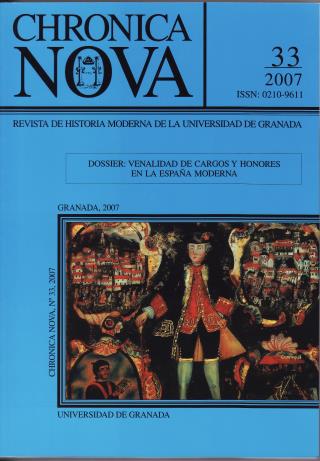The Sale of Magistracies in the Kingdom of Naples during the Reigns of Carlos II and Philip V
DOI:
https://doi.org/10.30827/cn.v0i33.1765Keywords:
Venality, Government, Monarchy, Carlos II, Philip V, Spanish Italy, Social Mobility, NaplesAbstract
The process of the venality of ministerial post in the supreme courts of the provinces of the Spanish Italy began during the crisis of 1640, though in a few years the sales were interrupted. During the reign of Carlos II the sale of a big number of supernumerary job in the courts of Naples and Milan began. In the kingdom of Naples the sold charges belonged most of them to the court that was managing the treasury, the chamber of the Summaria. The sales increased in the last two decades of the century affecting the magistracies of the council of Santa Clara. In the initial phase of the venality the Council of Italy was conducting the sales in the court of Madrid, though progressively was losing the control of the process in favour of the Secretary of the Universal Office. In general the obtained money was destined to military expenses of the monarchy. The venality aroused a fracture of the ministerial cursus honorum and reinforced the strength of enriched families coming from popular conditions of the kingdom of Naples. The sales continued under the reign of Philip V up to the loss of the kingdom in 1707.
Downloads
Downloads
Published
How to Cite
Issue
Section
License
Nuestra revista se atiene a las recomendaciones para la implementación del Artículo 37 Difusión en Acceso Abierto de la Ley de la Ciencia, la Tecnología y la Innovación:
- Los/as autores/as cuyas contribuciones sean aceptadas para su publicación en esta revista conservarán el derecho no exclusivo de utilizar sus contribuciones con fines académicos, de investigación y educativos, incluyendo el auto-archivo o depósito de los artículos aceptados en repositorios institucionales o temáticos de acceso abierto de cualquier tipo en un plazo máximo de seis meses.
- Preferiblemente se permitirá el uso de la versión publicada de las contribuciones científicas, que estarán accesibles en abierto tan pronto como sea posible.
-
Que en caso de que el trabajo sea aprobado para su publicación, el/la autor/a autoriza de manera ilimitada en el tiempo a la entidad editora para que incluya dicho texto en Chronica Nova y pueda reproducirlo, editarlo, distribuirlo, exhibirlo y comunicarlo en el país y en el extranjero por medios impresos, electrónicos, CD, Internet o cualquier otro medio conocido o por conocer.






 ISSN-e: 2445-1908
ISSN-e: 2445-1908










